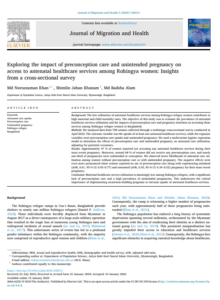
Background
The low utilization of antenatal healthcare services among Rohingya refugee women contributes to high maternal and child mortality rates. The objective of this study was to evaluate the prevalence of antenatal healthcare services utilization and the impacts of preconception care and pregnancy intention on accessing these services among Rohingya refugee women in Bangladesh.
Methods
We analyzed data from 708 women collected through a multistage cross-sectional survey conducted in April 2023. The outcome variable was the uptake of at least one antenatal healthcare services, while the exposure variables were preconception care uptake and unintended pregnancy. We used a multivariate logistic regression model to determine the effects of preconception care and unintended pregnancy on antenatal care utilization, adjusting for potential covariates.
Results
Approximately 47 % of women reported not accessing any antenatal healthcare services during their most recent pregnancy. Moreover, around 68 % of women did not receive any preconception care, and nearly one-third of pregnancies were unintended at conception. We observed lower likelihoods of antenatal care utilization among women without preconception care or with unintended pregnancy. The negative effects were even more pronounced when women reported no use of preconception care along with experiencing mistimed (aOR, 0.61, 95 % CI: 0.45–0.77) and unwanted (aOR, 0.43, 95 % CI: 0.34–0.52) pregnancy for their most recent pregnancy.
Conclusion
Maternal healthcare service utilization is alarmingly low among Rohingya refugees, with a significant lack of preconception care and a high prevalence of unintended pregnancies. This underscores the critical importance of implementing awareness-building programs to increase uptake of antenatal healthcare services.